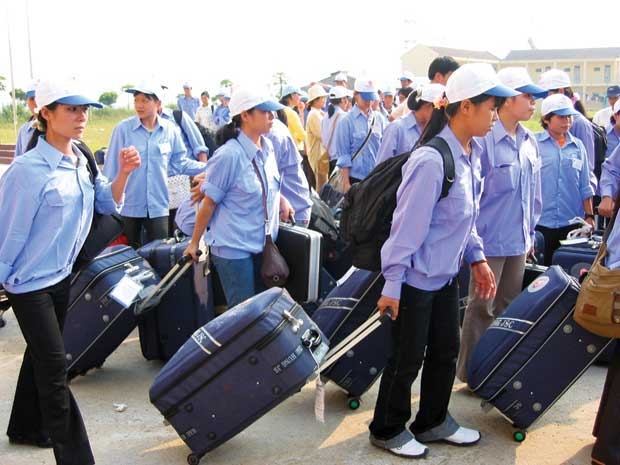Vietnamese labour export prospects narrow
 In 2012, some 80,000 Vietnamese labourers worked abroad, a 10,000 shortfall on the original target. South Korea was the largest market for Vietnamese overseas labour, employing more than 60,000 Vietnamese.
In 2012, some 80,000 Vietnamese labourers worked abroad, a 10,000 shortfall on the original target. South Korea was the largest market for Vietnamese overseas labour, employing more than 60,000 Vietnamese.
Japan, Malaysia and especially South Korea reported that the number of Vietnamese workers employed had dropped sharply in 2012.
In the case of South Korea, more than 15,000 Vietnamese workers had absconded at the conclusion of their labour contracts, forcing the country to suspend its plans to receive more overseas workers. To date, around 12,000 Vietnamese remain on waiting-lists hoping to work in South Korea.
Despite efforts by the Ministry of Labour, Invalids and Social Affairs, absconding Vietnamese employees have continued to complicate labour export relations with South Korea.
Malaysia has traditionally been a popular market, but while demand for labour is high, incomes are limited to VND3-8 million per month. Low wages meant that only 10,000 Vietnamese workers took up jobs in Malaysia, a third of the total a few years ago.
Japan received just 5,500-6,000 workers last year from Vietnam, as despite the high demand for labour, Vietnamese employees were thought to lack the necessary skills. In 2012, Taiwan took in about 25,000 workers and this figure is expected to be maintained in 2013.
There are also brighter prospects in post-conflict Libya. The country previously used to receive tens of thousands of Vietnamese workers annually and offered attractive salaries. However, the unstable political situation in the country in 2011 saw all Vietnamese nationals in the country return home. At present, some 600 Vietnamese workers have returned to Libya to work mainly on construction projects.
Dang Huy Hong, general director of the International Manpower Supply and Trade Company Ltd (SONA) said that the salaries of Vietnamese labourers in Libya had now returned to pre-conflict levels.
“If nothing changes, SONA will attempt to resume labour exports to Libya, making it one of the largest labour export markets in 2013,” said Dao Cong Hai, deputy director of DOLM.
Besides traditional markets, other some markets such as Angola, the Republic of Sip and Chinese Macau are also keen on Vietnamese workers.
However, Hai added that to increase the number of Vietnamese working abroad in 2013 and the ensuring years, workers would need to improve their attitudes towards their work, increase their foreign language skills and not abscond at the end of their labour contracts.
What the stars mean:
★ Poor ★ ★ Promising ★★★ Good ★★★★ Very good ★★★★★ Exceptional
Related Contents
Latest News
More News
- Hermes joins Long Thanh cargo terminal development (February 04, 2026 | 15:59)
- SCG enhances production and distribution in Vietnam (February 04, 2026 | 08:00)
- UNIVACCO strengthens Asia expansion with Vietnam facility (February 03, 2026 | 08:00)
- Cai Mep Ha Port project wins approval with $1.95bn investment (February 02, 2026 | 16:17)
- Repositioning Vietnam in Asia’s manufacturing race (February 02, 2026 | 16:00)
- Manufacturing growth remains solid in early 2026 (February 02, 2026 | 15:28)
- Navigating venture capital trends across the continent (February 02, 2026 | 14:00)
- Motivations to achieve high growth (February 02, 2026 | 11:00)
- Capacity and regulations among British areas of expertise in IFCs (February 02, 2026 | 09:09)
- Transition underway in German investment across Vietnam (February 02, 2026 | 08:00)

 Tag:
Tag:




















 Mobile Version
Mobile Version